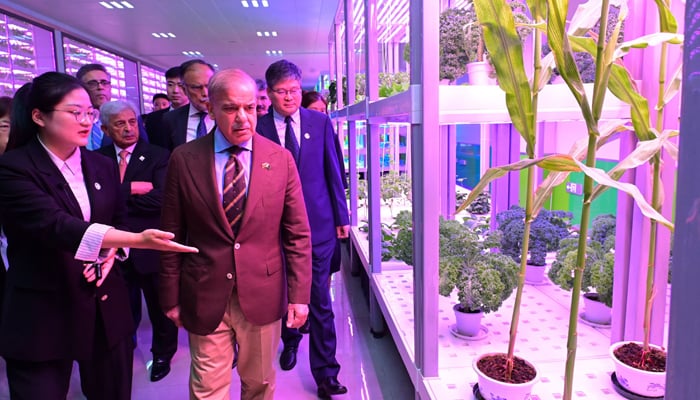
Pakistan,China oppose ‘unilateral actions’ on Kashmir issue
Reaffirm to strengthen strategic relationship, safeguard common interests, promote socio-economic development,
Bejing; In a joint statement issued following the conclusion of Prime Minister Shehbaz Sharif’s visit to China, both nations reiterated their opposition to any unilateral actions aimed at resolving outstanding issues in South Asia, particularly the Kashmir dispute.
During his four-day visit, Prime Minister Shehbaz Sharif engaged in discussions with top Chinese leadership, including President Xi Jinping and Premier Li Qiang, focusing on enhancing bilateral ties and bolstering Chinese investments in Pakistan amidst its economic challenges.
Work together to jointly uphold regional peace, stability, development and prosperity, and accelerate the building of an even closer ‘Pakistan-China Community with a Shared Future in the New Era’, said a joint statement between the Islamic Republic of Pakistan and the People’s Republic of China issued at the conclusion of Prime Minister Muhammad Shehbaz Sharif’s five-day visit to China.
The two sides had candid and in-depth exchanges of views on the entire spectrum of bilateral relations as well as regional situation and international landscape and reached extensive consensus on further strengthening the Pakistan-China All-Weather Strategic Cooperative Partnership and promoting practical cooperation in various areas, and on international and regional issues of mutual interest, a press statement of the Foreign Office said.
Agreed that Pakistan and China are All-Weather Strategic Cooperative Partners and ironclad friends, and the two countries have always understood, trusted and supported each other. Since the establishment of diplomatic ties 73 years ago, Pakistan-China relations have stood the test of changing international environment and have been as solid as a rock, and as unshakable as a mountain.
1,000 students to China for agriculture training,

Before concluding his five-day visit to China, Prime Minister Shehbaz Sharif on Saturday announced sending as many as 1,000 students to the brotherly country for advanced training in agriculture sector.
The announcement came during the premier’s visit to Yangling Agricultural Demonstration Base in Xi’an, China, Radio Pakistan reported.
On the occasion, PM Shehbaz also invited China’s North West Agriculture and Forestry University to open a campus in Pakistan and directed the Pakistan’s ambassador to China and relevant authorities to finalise the matters with the Chinese authorities in this regard.
Before the announcements, the PM toured various parts of the facility and was shown Pakistani products at the Pakistan Pavilion. He also visited the modern plant production factory where he oversaw a demonstration of vertical method of agriculture.
“Pakistan is striving to modernise its agriculture sector to increase per acre yield of crops. Increasing the agricultural exports is one of our top most priorities,” PM Shehbaz told the Chinese officials.
Moreover, the prime minister was given a briefing about the working of the Yangling Base. He was told that 26 countries were collaborating in agricultural research at the base and Pakistan was the first one to participate.
China, Pakistan ink 23 MoUs for cooperation in industry
He was also briefed about Pakistani universities and scientists taking part in research at Yangling Base.
PM Shehbaz later flew back to the country, accompanied by his high-level delegation.
During the visit, the premier held meetings with the Chinese leadership, authorities, and businessmen and investor companies.
The prime minister had undertaken the visit at the invitation of Li Qiang, Premier of the State Council of the People’s Republic of China.
“Both sides opposed hegemony, domineering and bullying, exclusionist approaches, opposed power politics, as well as unilateralism in all forms. The two sides reaffirmed their commitment to jointly upholding the international system with the United Nations as its core, the international order underpinned by international law, and the basic norms governing international relations underpinned by the purposes and principles of the United Nations Charter, adhere to true multilateralism, work for a just and more equitable international order, safeguard the peace and stability of the region and the world,” it was added.
The two sides agreed to further strengthen communication and coordination in the United Nations, the Shanghai Cooperation Organization and other multilateral platforms. The two sides reiterated that the fundamental way out of the current crisis in Gaza lies in the Two-State solution and the establishment of an independent State of Palestine.
The resolution adopted by the UN Security Council is legally binding, and should be enforced effectively to achieve an unconditional and lasting ceasefire immediately. The two sides called on the international community for increasing political input into the Palestinian question with a greater sense of urgency, stepping up efforts to facilitate the early resumption of peace talks between Palestine and Israel, and strive for enduring peace,





Comments are closed, but trackbacks and pingbacks are open.